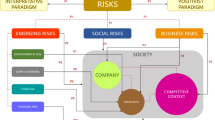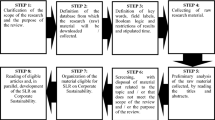Abstract
Sustainability is a keyword commonly used by researchers and practitioners globally. However, even defining the goals of sustainability is fraught with difficulties and hence attaining it is nearly impossible. Since sustainability is a property of the entire system, engineering sustainability requires the boundaries of the system greatly expanded. The thinking of sustainability also brings in larger time scales. In this article, I present a perspective on journey toward sustainability using systems analysis approaches from various disciplines.














Similar content being viewed by others
References
AIChE (1995) AIChE symposium series on pollution prevention through process and product modifications. American Institute of Chemical Engineers, New York, 90
Bakshi B, Fiksel J (2003) The quest for sustainability: challenges for process systems engineering. AIChE J 49:1350
Bare J (2014) Development of impact assessment methodologies for environmental sustainability. Clean Technol Environ Policy 16:681
Beloff B (2013) The case and practice for sustainability in business, metrics. In: Cabezas H, Diwekar U (eds) Sustainability: a multi-disciplinary perspective. Bentham e-books, Beijing, p 310
Brans J, Vincke P (1985) A preference ranking organization method: the PROMETHEE method for multiple criteria decision making. Manag Sci 31(6):647–656
Cabezas H (2013) Sustainability Indicators and Metrics. In: Cabezas H, Diwekar U (eds) Sustainability: a multi-disciplinary perspective. Bentham e-books, Beijing, p 197
Cabezas H, Bare J, Mallick S (1997) Pollution prevention with chemical process simulators: the generalized waste reduction (WAR) algorithm. Comp Che Eng 21:S305
Čuček L, Klemeš J, Varbanov P, Kravanja Z (2013) Dealing with high-dimensionality of criteria in multiobjective optimization of biomass energy supply network. Ind Eng Chem Res 52:7223
Diwekar U (2003) Greener by design. Environ Sci Technol 37:5432
Diwekar U (2005) From green process design to industrial ecology to sustainability. Resour Conserv Recycl 44:215
Diwekar U (2008) Introduction to applied optimization, 2nd edn. Springer, New York
Diwekar U, David A (2014) Better optimization of nonlinear uncertain systems (BONUS) algorithm with real world applications, (in press, to be published as optimization briefs by Springer)
Diwekar U, Shastri Y (2010) Green process design, green energy, and sustainability: a systems analysis perspective. Comput Chem Eng 34:1348
Diwekar U, Shastri Y (2011) Design for environment: a state-of-the-art review. Clean Technol Environ Policy 13:227
Diwekar U, Ulas S (2007) Sampling Techniques, Kirk-Othmer encyclopedia of chemical technology, vol 26. Wiley, New York, p 998 (Online Edition)
Dorini G, Kapelan Z, Azapagic A (2011) Managing uncertainty in multiple-criteria decision making related to sustainability assessment. Clean Technol Environ Policy 13:133
Doshi R, Diwekar U, Benavides P, Yenkie K, Cabezas H (2015) Maximizing Sustainability of Ecosystem Model through Socio-Economic Policies Derived from Multivariable Optimal Control Theory. Clean Technol Environ Policy. doi:10.1007/s10098-014-0889-2
Ehrenfeld J, Gertler N (1997) Industrial Ecology in Practice: the Evolution of Interdependence at Kalundborg. J Ind Ecol 1(1):67
El-Halwagi M (2011) Sustainable design through process integration: fundamentals and applications to industrial pollution prevention, resource conservation, and profitability enhancement. Elsevier, Oxford
Fu Y, Diwekar U (2004) An efficient sampling approach to multi-objective optimization. Ann Oper Res 132:109
Fu Y, Diwekar U, Young D, Cabezas H (2000) Process design for the environment: a multi-objective framework under uncertainty. Clean Prod Process 2:92
Gigerenzer G, Goldstein DG (2000) Reasoning the fast and frugal way: models of bounded rationality. In: Connolly T, Arkes HR, Hammond KR (eds) Judgement and decision making. Cambridge University Press, Cambridge, p 621
Halfon E, Reggiani MG (1986) On ranking chemicals for environmental hazard. Environ Sci Technol 20:1173
Heberling M, Hopton M (2014) Assessing sustainability when data availability limits real-time estimates: using near-time indicators to extend sustainability metrics. Clean Technol Environ Policy 16:739
Hwang C, Yoon K (1981) Multiple attribute decision making: methods and applications. Springer, Berlin
Iman RL, Conover WJ (1982) Small sample sensitivity analysis techniques for computer models, with an application to risk assessment. Commun Stat A17:1749
IPCC (2007) IPCC Fourth Assessment Report (http://www.ipcc.ch/publications_and_data/publications_ipcc_fourth_assessment_report_synthesis_report.htm)
Ito K (1951) On stochastic differential equations. Mem Am Math Soc 4:1
Ito K (1974) On stochastic differentials. Appl Math Optim 4:374
Kalagnanam J, Diwekar U (1997) An efficient sampling technique for off-line quality control. Ann Oper Res 38:308
Kotecha P, Diwekar U, Cabezas H (2012) Model-based approach to study the impact of biofuels on the sustainability of an ecological system. Clean Technol Environ Policy 15:21
McKay MD, Beckman RJ, Conover WJ (1979) A comparison of three methods of selecting values of input variables in the analysis of output from a computer code. Technometrics 21:239
Petrie J, Kempener R, Beck J (2013) Industrial ecology and sustainable development: dynamics, future uncertainty and distributed decision making. In: Cabezas H, Diwekar U (eds) Sustainability: a multi-disciplinary perspective. Bentham e-books, Beijing, p 243
Roy B (1968) Classement et choix en presence de points devue multiples (la methode ELECTRE). Revue d’Informatique et de recherché opérationelle 6(8):57
Saaty T (1980) The analytic hierarchy process. McGraw Hill, New York
Sikdar S (2014) Macro, Meso & Micro aspects of sustainability, trans-atlantic research and development interchange on sustainability. TARDIS 2014, Estes Park, CO
Singh S, Olugu E, Fallahpour A (2014) Fuzzy-based sustainable manufacturing assessment model for SMEs. Clean Technol Environ Policy 16:847
Smith R, Ruiz-Mercado G (2014) A method for decision making using sustainability indicators. Clean Technol Environ Policy 16:749
Vinodh S (2011) Assessment of sustainability using multi-grade fuzzy approach. Clean Technol Environ Policy 13:509
Vinodh S, Joy D (2012) Structural equation modeling of sustainable manufacturing practices. Clean Technol Environ Policy 14:79
Wang R, Diwekar U, Gregoire-Padro C (2004) Latin hypercube hammersley sampling for risk and uncertainty analysis. Environ Prog 23:141
WCED World Commission on Environment and Development (1987) Our Common Future. Oxford University Press, Oxford
White A (1994) Preface. In: The greening of industrial ecosystems, National Academy of Engineers, 549 National Academy Press, Washington, DC
Wille R (1982) Restructuring lattice theory: an approach based on hierarchies of concepts. In: Rival I (ed) Ordered set. Reidel, Dordrecht-Boston
Zeleny M (1973) Compromise programming. In: Cochrane J, Zeleny M (eds) Multiple criteria decision making. University of South Carolina Press, Columbia
Author information
Authors and Affiliations
Corresponding author
Rights and permissions
About this article
Cite this article
Diwekar, U. Perspective on pursuit of sustainability: challenges for engineering community. Clean Techn Environ Policy 17, 1729–1741 (2015). https://doi.org/10.1007/s10098-015-0915-z
Received:
Accepted:
Published:
Issue Date:
DOI: https://doi.org/10.1007/s10098-015-0915-z




